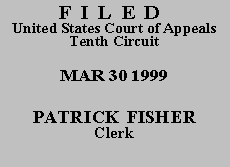

| JAMES E. RICE,
Plaintiff-Appellant, v. KENNETH S. APFEL, Commissioner, Social Security Administration, Defendant-Appellee. |
|
Claimant James E. Rice appeals from an order of the magistrate judge, sitting for the district court by consent of the parties pursuant to 28 U.S.C. § 636(c)(1), affirming the denial of his application for social security disability benefits. We have jurisdiction under 28 U.S.C. §§ 636(c)(3), 1291 and 42 U.S.C. § 405(g), and we affirm.
Mr. Rice alleges disability since November 1993, primarily due to pain from a back impairment.(1) The administrative law judge (ALJ) denied benefits at step five. See 20 C.F.R. § 416.920; see generally Williams v. Bowen, 844 F.2d 748, 750-51 (10th Cir. 1988) (discussing five-step analysis). He concluded that, although Mr. Rice was unable to return to his past work, which required medium to heavy physical exertion, he retained the capacity to perform light work, "restricted by his need to change positions from time to time and limiting his ability to stand for more than 1 hour at a time, walk for more than 1 hour at a time, or sit for more than 1 hour at a time," Appellant's App., vol. II at 22.
In this court, Mr. Rice contends that the ALJ (1) improperly discounted his subjective claims of disabling pain; and (2) did not fulfill his duty to develop the record because he did not order a consultative examination. On appeal, we "closely examine the record as a whole to determine whether the [ALJ's] decision is supported by substantial evidence and adheres to applicable legal standards." Evans v. Chater, 55 F.3d 530, 531 (10th Cir. 1995). We may not reweigh the evidence or substitute our judgment for that of the agency. See Kelley v. Chater, 62 F.3d 335, 337 (10th Cir. 1995).
We turn first to Mr. Rice's assertion that, in assessing the credibility of his allegations of disabling pain, the ALJ failed to follow the dictates of Kepler v. Chater, 68 F.3d 387, 391 (10th Cir. 1995) (requiring credibility findings to be "closely and affirmatively linked to substantial evidence"). We disagree.
A reading of the ALJ's decision shows a variety of reasons for his evaluation of Mr. Rice's testimony on the extent of his "constant," "sharp," and "burning" pain in his lower back, hips, and legs. Appellant's App., vol. II at 45. In considering the objective and subjective evidence, the ALJ first observed that there was no medical evidence of osteopathic or neurological abnormality. He also took note of Mr. Rice's daily schedule, which showed he had the ability to perform needed errands and fix meals. More importantly, he cited Mr. Rice's testimony that he could lift ten pounds and walk, stand, or sit for about an hour.
"'Credibility determinations are peculiarly the province of the finder of fact.'" Winfrey v. Chater, 92 F.3d 1017, 1020 (10th Cir. 1996) (quoting Diaz v. Secretary of Health & Human Servs., 898 F.2d 774, 777 (10th Cir. 1990)). On this record, we see no reason not to defer to the ALJ.
Mr. Rice's second claim of error is that the ALJ breached his duty to develop the record, in that he failed to order a consultative examination by an orthopedic or neurological specialist. "The duty to develop the record is limited to 'fully and fairly develop[ing] the record as to material issues.'" Hawkins v. Chater, 113 F.3d 1162, 1168 (10th Cir. 1997) (quoting Baca v. Department of Health & Human Servs., 5 F.3d 476, 479-80 (10th Cir. 1993)); see also 20 C.F.R. § 404.1519a(b) ("A consultative examination may be purchased when the evidence as a whole, both medical and nonmedical, is not sufficient to support a decision on your claim.").
On this record, no further investigation into Mr. Rice's back impairment was required. A consultative examination would not have been "of material assistance in resolving the issue of disability." Hawkins, 113 F.3d at 1169. Mr. Rice's admitted exertional capacity, coupled with the vocational expert's testimony concerning the available positions that he could perform, fully supported the ALJ's step-five determination that he is not disabled.(2) The ALJ adequately explored Mr. Rice's claim of a disabling pain arising from a back impairment.
AFFIRMED.
Entered for the Court
Circuit Judge
*. This order and judgment is not binding precedent, except under the doctrines of law of the case, res judicata, and collateral estoppel. The court generally disfavors the citation of orders and judgments; nevertheless, an order and judgment may be cited under the terms and conditions of 10th Cir. R. 36.3.
1. Mr. Rice also has diabetes, high blood pressure, heart problems, and depression. The issues raised on appeal, however, relate only to lower back, hip, and leg pain. Because Mr. Rice makes no claims of error regarding his other conditions, we need not discuss them. See Murrell v. Shalala, 43 F.3d 1388, 1389 n.2 (10th Cir. 1994) (limiting the scope of our review to the issues properly preserved and presented by the appellant).
2. A need to nap in the afternoon one to two times per week is the only limitation alleged by Mr. Rice which the vocational expert testified would preclude employment. See Appellant's App., vol. II at 52, 56. The ALJ did not accept this limitation as true.